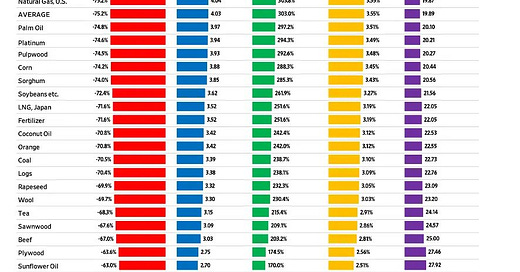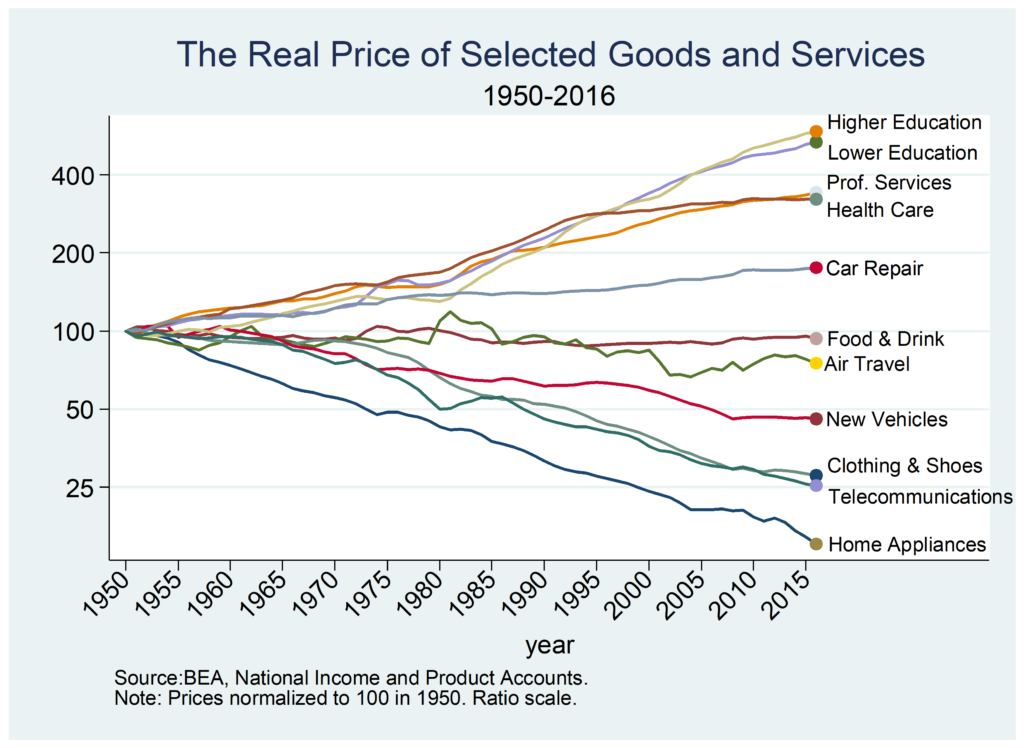Capitalism's Productive Capacity is an Argument for Socialism
when our species gets this productive, how can we justify anyone being poor?
The chart above is a bit hard to parse at first glance, but its basic point is clear - in 40 years, these commodities have all gotten vastly cheaper as expressed in the amount of time one would have to work to afford them. Food production is a particularly important element of productivity increases, for obvious reasons. Here’s wheat production in the poorest countries over time, to pick one.

What’s interesting to me is that these remarkable improvements in productivity - this immense growth in material abundance - is typically used as evidence for capitalism and against socialism. Look at how great capitalism is! Why would we ever want to change to a different system? And yet to me, the lesson is the opposite: look at how advanced humanity is! Why would we let anyone go hungry or cold when we have this kind of productive capacity? The more that humanity advances, the more the implicit argument for socialism grows stronger. And I have zero problem with ascribing that growth to capitalism, as long as people get on board with a more humane stage to come.
Forgive me for repeating the point, but Karl Marx and Friedrich Engels were not anti-capitalists but post-capitalists, and Marxist economics hold that capitalism is an absolutely necessary stage of human development before socialism can flourish. 19th-century British capitalism caused the human misery that so offended Marx, yes, but it also created the awesome productive power that inspired him to think a society of universal abundance was possible. This, before any other reason, is why communism really never has been attempted - because none of the countries that attempted communism did so following a sufficient period of capitalist productive activity. How could the Russia of 1917 - a dirt-poor, undeveloped country already suffering from famine that had experienced decades of terrible mismanagement by an incompetent monarchy - have fulfilled the promise of a social system that provides for all of us? At some point we have to ask what possible relevance the experiences of the Russians and the Chinese 100ish and 75ish years ago can have to America today, when it comes to providing for our people.
And we have examples of countries that are far more generous in redistributing wealth and which own far more of their local economies than the United States. No, the Nordic states are not socialist systems, but they are countries with far more socialized economies who nevertheless have not turned off the productivity spigot. Indeed, Norway, Denmark, Iceland, and Finland are all among the 15 most productive countries on earth. There is no credible reason to believe that reducing the fear of poverty in those states has reduced the desire to work, develop, and flourish in those countries, given that they are sites of scientific advance, academic excellence, and good government. (And for the record the richest guy in Denmark, which enjoys the most equal society in the OECD and perhaps the lowest poverty in the world, is still worth like $11 billion. You know anybody who would say, “you know, I would work hard, but $11 billion just isn’t enough to hustle for”?)
The trouble here is with Baumol’s cost disease, the tendency of certain kinds of labor-intensive, service-oriented sectors to keep getting more expensive even while physical goods get reliably cheaper. It’s a major problem and not one with an obvious solution. Let’s be clear that this isn’t in any sense a problem only of countries with more progressive economies. Education, healthcare, administration, housing - these things have not only not kept pace with improvements to productivity in food and (especially) consumer goods, they’ve gotten vastly more expensive across the capitalist world. Socialism would not necessarily fix these problems. But a socialized system with a strong central government would be able to implement common-sense reforms to help keep costs down, such as a single-payer health system that eliminates a great deal of insurance company rent-seeking and sets prices, regulations on expensive amenities and the number of administrators at colleges, and pro-density policies that allow more building of housing, particularly in our urban cores.
Of course, the fact that no countries have followed advanced capitalism with communism might suggest that capitalism is good enough that people don’t want to switch. And in my darker moments I often think that the short-term dopamine-delivering pleasures of capitalism, the video games and Tik Toks and internet porn and big screen TVs and beer, are too powerful, that they serve to stop people from being roused to confront the innumerable inequities and injustices in our system. But I will say this: I’ve never met anyone who doesn’t agree with the system of universal abundance in Star Trek, given the conditions in Star Trek. This isn’t a joke: I mean that, if you present people with a society where technological progress is so advanced that abundance for everyone is possible, even the most ardent capitalist will concede that it would be immoral to perpetuate a system that did not allow for the distribution of abundance to everyone. But then, Star Trek is Star Trek. The compelling questions are, what level of abundance is sufficient to prompt this moral imperative, and how do we know when we’vee gotten there?













I have a background as a corporate IT executive. I remember driving home from work one day depressed after a meeting with a division head that wanted a new multi-million dollar computer system that would be funded by the savings it would derive in a reduction in workforce. I was literally working in a discipline to reduce the number of jobs in corporate America.
Currently I own and run a couple of small businesses. One of them is a non-profit that provides financing to small business with a mission to grow jobs in the communities we serve (a tonic to my previous professional job-destruction role). Both of my businesses have seen personnel costs and other costs rise, primarily because of the constant increase in regulatory compliance, fee and taxes and dumb policy moves... with the fees and taxes going to government... government that keeps expanding and with government employees that are all paid significantly more than their private sector peers in total compensation.
In the other business, which is a food product manufacturing operation, we needed a piece of equipment to support a task that was significantly difficult manual labor. The equipment was only made in China and Canada... even though the design of the equipment was originally made in the US and produced in the US. The Canadian version of the equipment was not a good fit for our application (they were targeting larger operations). So I had to purchase a Chinese version. The installed equipment freed up my employees to do more valuable labor.
I would have paid 2x or 3x the cost of the Chinese equipment to purchase USA-made equipment.
However, it is not made here. It is not made here for several reasons.
1. It requires welders, and welders are in short supply in the US.
2. The business to make the equipment is industrial and the US regulations for starting an industrial business are complex, costly and restrictive.
3. The energy costs for an industrial equipment manufacturer are extreme in many parts of the US.
4. US parents have sent their kids to expensive liberal arts schools and the kids don't want to work at any physical labor.
5. The parts of the country where these jobs would be welcome are a mess with drug problems and crime. And the education system sucks so bad that there the number of people that can be trained to do the jobs required to manufacture the equipment are too few.
Today there are millions of unfilled jobs, and plenty of opportunity to start and grow small businesses that would provide more jobs. However, the Marxists know that they are better served to push these narratives of automation causing the need to approve Universal Basic Income.
One last point. Collectivism does not work. It sucks in any form. You cannot pay people to not work and expect human needs will be met. We are better off subsidizing work as needed to get more humans doing productive things. We are entering an anti-work cultural shift that is terrible and will be the end of us if it continues.
I think you're making two fundamental errors here. One, you're not distinguishing productivity and distribution. Two, you're not distinguishing what productivity gains are technological and what are non-technological. These are important distinctions!
Start with one. You characterize Denmark, Sweden and so on as "more socialist" -- but their difference from what you would call "less socialist" countries, like the United States, is overwhelmingly in their distribution of wealth, not in their production of it. Both groups have golden gooses. They distribute the eggs quite differently. But their gooses are not very different at all. You can't use the success of messing with distribution as evidence that it would be good to mess with production. They aren't the same things. To say otherwise would be to say that, oh, ok, since messing with who gets the eggs works fine, it would also be ok to mess with the goose. That's obviously not true, and it's how you end up with a dead goose.
Second. Not all of the gains in productivity are technological. We've all had or heard of bad bosses. Not jerks or criminals, but ones who organize things badly, who make bad decisions. Bosses who are not engineers but harass the engineering team with useless suggestions and directives. Bosses who are lawyers that insist that the support staff use a word document for a task that is obviously more suited to a spreadsheet, because the lawyer is more comfortable with word documents. Bosses who insist on unanimity as a decision-making process only to discover that the only way to get that unanimity is to kick out the dissenters, which they do. It's easy to believe that these things are symptoms of capitalism, but there's another possibility which is that this sort of behavior is basically human, and capitalism's pressures to deliver the goods (especially in more competitive industries) significantly reduces such behavior. I certainly believe that, and if those of you that have worked with or seen a lot of badly-managed movements in the non-capitalist space consider how much bad management they have vs. how much bad management is in business, you may find that you believe it too. Good management is hard, and transitioning social systems can 100% throw it down the drain. I know you don't like to use the example of Chinese communist experiences because they are old, but I really think that the fact that farms in China became outrageously more productive once Deng Xiaoping allowed them to operate privately is a pretty clear indicator that it isn't all about technology. Those farms didn't suddenly get a bunch of technological breakthroughs. The technology was the same before and after. What they got was better management. It's not all about the tech.